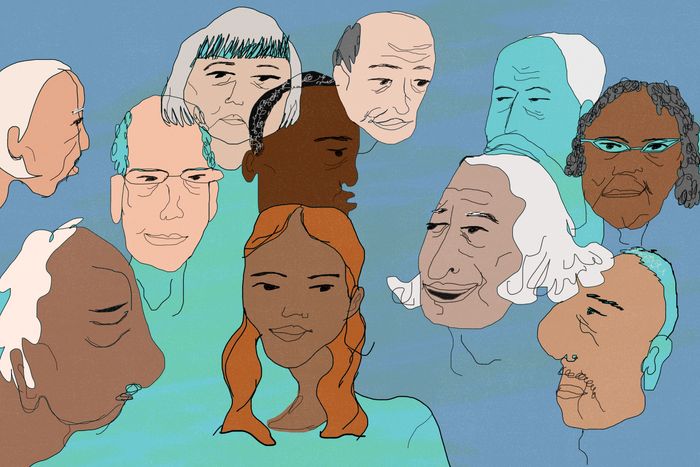
This article originally appeared in Brooding, a newsletter delivering deep thoughts on modern family life. Sign up here.
America has always self-identified as a youthful culture, so what happens when so much of the population gets old? A recent piece by the New York Times editorial board laid it out in black and white: By 2034, for the first time in U.S. history, there will be more people over 65 than under 18, and that gap will widen thereafter. The need to care for the growing number of old people is going to require our society to reorient itself toward the elderly.
What could that look like? It may mean adjusting to the pace of an older workforce, learning patience as people take longer to move around. Perhaps older people will start working in child care alongside the younger people who typically do that work. Hopefully we’ll spend more time hanging out intergenerationally without making it corny.
The elder crisis looms like a way-worse child-care crisis. Child care is hard in a lot of the same ways elder care is hard — there’s lots of room for personal baggage, interpersonal resentment, guilt, and (yes) anger. But elder care doesn’t have the benefit of being “the best job in the world,” or being cute, for that matter. And perhaps most important, elder care doesn’t have as many jokes.
There is no “You’re doing great, Mama” discourse on Facebook for those who care for elders. We are still very much in the era where caring for old people is considered a dreadful task worthy of pity. Nobody wants to hear about it. Why is it not funny on the internet yet? Is it because watching The Golden Girls and Murder, She Wrote as children gave us the false promise that our parents would be gleefully independent until death? We do fetishize certain old people — the very stylish elderly, or the exceptionally steely elderly, like RBG, or “adorable” grandmas. But these caricatures have nothing to do with real life. When it comes to living alongside old people in a mutually nurturing way, very few of us have any frame of reference at all.
To cope with the intimate challenges of caring for and loving people who can’t care for themselves, it’s essential to humanize both ourselves and the people we’re responsible for. One of the easiest and most fun ways to do that — as anyone who’s cared for a dying loved one already knows — is to laugh at the whole thing together. Imagine someday having dinner with your usual friend group and talking about the caregiving relationship you have with an old person in your life. Instead of your friends’ eyes glazing over or their immediately offering you bland expressions of sympathy, you might share some laughs and offer some perspective — not unlike how we act when we talk about our kids.
When my parents were sick and dying, I barely spoke about it with anyone because doing so felt extremely socially cumbersome. I have close friends who have recently cared for and lost parents and who went through the same profound isolation because they were tired of getting the same stilted expressions of sympathy every time they brought it up. For that to change, we need shared material — images, scripts, stories, jokes — that make us feel like we’re all in it together.
It’s hard to believe that before social media there wasn’t a robust tradition of jokes about how hard it is to be a parent. People joked about parents — from classic Nichols and May sketches to SNL’s Gino’s Pizza Rolls skit — but jokes for parents, about their children, have been rare until recently. People joked in private about raising children, of course, but it didn’t exist as much of a genre. It was a fringe form of humor that breached some sacred social norms about the sanctity of childhood.
Today, most parents nurture an inner Jim Halpert, looking directly into a proverbial camera when their toddlers do exasperating toddler things. We parent alongside an imaginary audience who will laugh along with us, and this helps get us through tough moments. But it wasn’t until Tumblr and Instagram that this fledgling form of humor began to develop, and in its early days, it made people uncomfortable.
Around 2013, Greg Pembroke created the viral hit Tumblr Reasons My Son Is Crying, which he later turned into a book. This was an early entry into the new genre’s canon, and some people found it offensive that a father would make a joke out of a toddler’s tantrum. But most people thought it was harmless and pretty funny.
Parent-humor memes went along on a fairly even trajectory for the next few years. We saw the birth of the wine mom and Here Comes Honey Boo Boo, but it wasn’t until TikTok and Reels that the genre really began to take off with moms starting to do satirical little skits where they would roleplay as their entitled children. Jim Gaffigan and Ali Wong introduced us to parent stand-up with crossover appeal to non-parents.
I think parenting humor really came into its own as a genre, though, during COVID. Caregivers of young children were in crisis, and in the absence of any functioning care infrastructure, we did what we could do: We made memes.
During COVID’s golden age of parenting humor, we were laughing to survive, and conditions aren’t improving much. The need for affordable and accessible child care is more urgent than ever. Parenting humor as it exists today is both a symptom of and a treatment for living in an individualistic society that expects families to thrive without any access to social solidarity. Ha, ha.
Caring for young children is exhausting and it can push anyone to their limits, but caring for the elderly is categorically different. It can be scary and dreadful. Frailty in the old engenders a very different emotional response in most of us than does frailty in the young. It’s all so difficult that for the most part we try not to think about it. But approaching elderly people as a social problem best handled by other people is not only crass and inhumane, it’s not feasible anymore.
Caring for an ailing loved one can be excruciatingly lonely, like being the Little Prince, living all alone on his tiny planet. You never feel like Jim Halpert looking at an imaginary audience when you’re helping your old person out of the car. Part of this loneliness may be because our orientation toward the elderly feels stuck in the mind-set of a young country, which is not what we are anymore. The boomers brought us the first generationally perceptible “Fuck you, Dad” energy, which was good for making music and art but horrible for building a compassionate society oriented around care for the young and old. Before the boomers, life expectancy was shorter (the median was 62 in 1940), and the elderly were honored not just by custom, but because there weren’t many of them.
Because now we fetishize the young and turn away from the old, it puts old people themselves on their back foot, annoyingly insisting in very boomerish ways that they’re not actually old. This is humiliating for them and should be offensive to us. People don’t need to be young to be deserving of attention. Boomers are old. Seventy is old! It should be considered old! A robust new wave of humor about the ongoing encounter between middle-aged people and their parents would reaffirm all of our humanity and maybe take some of the pointless shame out of being old in the first place. We treat people with kid gloves when we don’t know what to do with them but we know we owe them something, and that seems like a horrible way to be treated, at any time in one’s life.
The coming decades will require us to change the way we approach the act of caring for our elderly family members. Maybe this is easy for me to say because both of my parents are dead. I am not suggesting that everyone will need to knuckle under and care more, care harder, reorganize their lives immediately, move back home into their childhood rooms or move Mom into the nonexistent guest room. I think we can start with something much smaller and more incremental, that might make the future less scary: We can start laughing about it.
More From This Newsletter
- Is Annoyance the Most Romantic Emotion?
- Trad or Not, We’re All Nostalgic for a Fake Past
- Should Kids Really Learn About Getting Rich?


